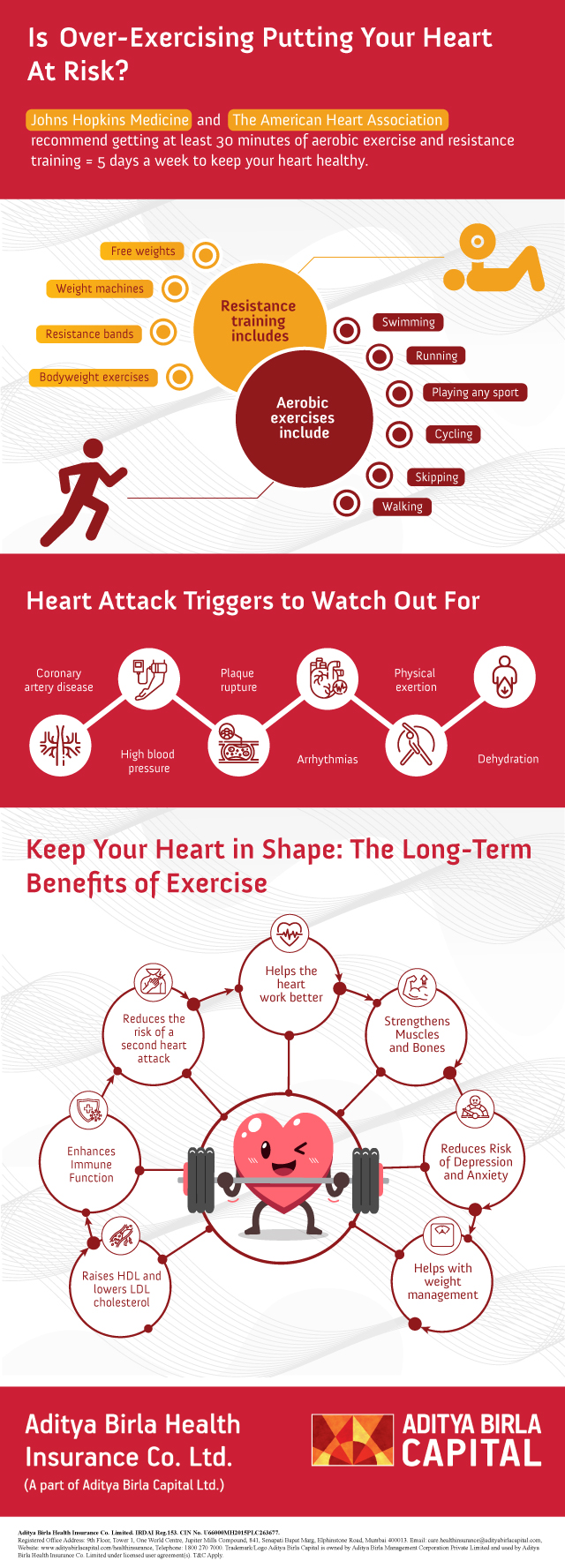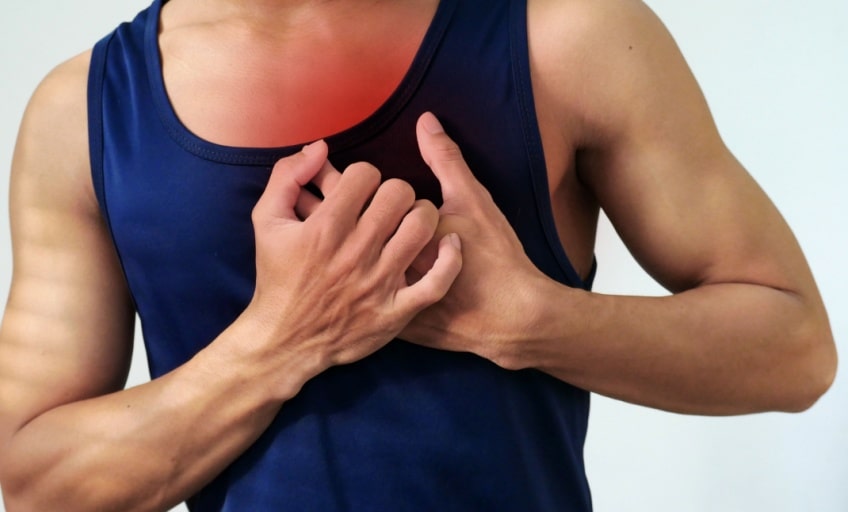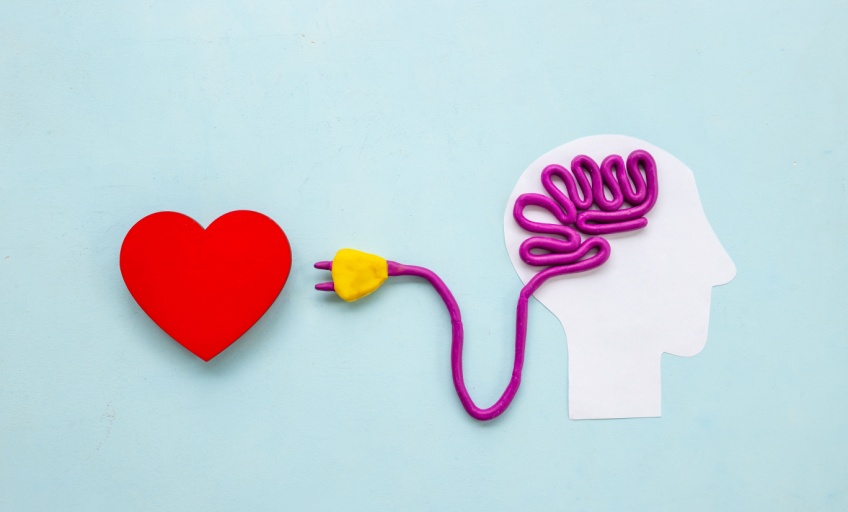
Your heart, the main organ in your cardiovascular system, is vital for life. Physical activity has many health benefits. It lowers your risk for many diseases, such as कोरोनरी हृदय रोग, diabetes, and cancer.
इनके बारे में जानें:
- The relationship between heart and exercise
- Understanding the link between exercise and heart attacks
- Heart attacks and exercise
- Exercise tips for heart health
The relationship between the heart and exercise

Exercise can have many positive effects on the heart, including:
- Strengthening the heart muscle: नियमित शारीरिक गतिविधि can strengthen the heart muscle, improving the heart’s ability to pump blood throughout the body.
- Increasing blood flow: During exercise, the heart beats faster to pump more blood to the body. This increases blood flow to the muscles and oxygen levels in the blood.
- Widening capillaries: Exercise causes the widening of capillaries, allowing them to deliver more oxygen to the body and remove waste products.
- Improving cardiovascular health: It can help lower blood pressure and कोलेस्ट्रॉल and help people with diabetes control their blood sugar.
- Reducing the risk of heart disease: Regular aerobic exercise can help the heart work better in people with heart disease and may also reduce the risk of a second heart attack.
Understanding the link between exercise and heart attacks
Can exercise cause a heart attack? Regular exercise can reduce the risk of heart attacks and other life-threatening cardiac events. However, vigorous exercise can be dangerous for people with heart disease, and some people may be at higher risk of heart attacks during exercise.
Some risk factors for heart attacks during exercise include:
- Physical fitness: People who aren’t physically fit are at higher risk than those who are.
- Age: Middle-aged and older adults with coronary heart disease are more likely to have a heart attack during exercise.
- Congenital heart problems: Youth and young adults with congenital heart problems, such as hypertrophic cardiomyopathy, congenital heart defects, etc., are also at a higher risk.
- पहले से मौजूद बीमारियां: Other risk factors include डायबिटीज, high blood pressure, a history of smoking, or a family history of heart problems.
- Overexertion: Exercising too fast or intensely or suddenly becoming active after a sedentary lifestyle can increase the risk.
Symptoms of a heart attack during exercise include:
- Intense chest pain or discomfort
- सांस फूलना
- चक्कर आना
- जी मिचलाने की समस्या
- Pain radiating to the arms, neck, jaw, or back
Heart attacks and exercise

Can exercise cause a heart attack? Let us explore the causes of a heart attack during exercise:
- Coronary artery disease (CAD): CAD occurs when the blood vessels supplying the heart muscle with oxygen-rich blood become narrowed or blocked due to plaque buildup. During exercise, the heart requires more blood flow and oxygen, and if the arteries are already narrowed, a clot can form, leading to a heart attack.
- Plaque rupture: Sometimes, the plaque buildup in the arteries can rupture or break open, forming a blood clot. When this clot blocks an artery that supplies blood to a part of the heart, it can cause a heart attack.
Stress on the heart: Intense physical activity, especially if you are not regularly active, can put excessive stress on the heart. This stress can lead to an increased demand for oxygen and blood flow to the heart. If the heart’s blood supply is compromised due to underlying conditions, it can trigger a heart attack. - High blood pressure: Uncontrolled high blood pressure can damage the arteries over time, making them more susceptible to plaque buildup. During exercise, elevated blood pressure combined with narrowed arteries can increase the risk of a heart attack.
- Arrhythmias: Abnormal heart rhythms, such as tachycardia, can occur during physical exertion. These irregular heartbeats can interfere with the heart’s ability to pump blood effectively, leading to a heart attack.
- Undiagnosed heart conditions: Some individuals might have undetected heart conditions, such as congenital heart defects or other structural abnormalities, which can increase the risk of experiencing a heart attack during exercise.
- Lifestyle factors: Smoking, a sedentary lifestyle, obesity, poor diet, excessive alcohol consumption, and stress can contribute to the development of cardiovascular diseases, thereby increasing the risk of a heart attack during exercise.
Exercise tips for heart health
Experiencing a heart attack during exercise is a frightening possibility, but there are measures you can take to lower the risk. Here are some preventive measures:
Start slow
Start slowly and gradually increase the workout intensity, duration, and frequency. Allow your body to adapt to the physical demands of exercise over time. Always warm up before exercising to prepare your muscles and cardiovascular system. Similarly, cool down after your workout to help your body gradually return to its resting state.
Listen to your body
Listen to your body, and don’t overexert yourself. Pushing too hard beyond your fitness level can strain your heart and increase the risk of a heart attack. Maintain proper hydration levels before, during, and after exercising. Dehydration can strain your heart and affect your overall performance.
While exercising is generally beneficial for heart health, it’s essential to know your limits, gradually increase intensity, and pay attention to warning signs your body might give you during physical activity. Always consult a healthcare professional before starting any new exercise regimen, especially if you have any pre-existing heart conditions or concerns. If you experience chest pain, shortness of breath, cold sweat, nausea, light-headedness, increased heart rate, or dizziness while exercising, you should stop immediately and seek medical attention.
Stay tuned to the Activ Living Community. Keep up to date with the latest health tips and trends through expert videos, podcasts, articles, and much more on पोषण, फिटनेस, सचेतन, और लाइफस्टाइल से जुड़ी बीमारियां like Asthma, Blood Pressure, Cholesterol, and Diabetes. Activ Living ke saath sahi sehat ki shuruat ABHI karo.
You may also be interested in the following blogs:
Popular Searches
How to lower blood pressure | Fruits good for liver | Unhealthy foods | रागी के लाभ | बेसल मेटाबोलिक रेट | हाई ब्लड प्रेशर के लिए एक्यूप्रेशर पॉइंट्स | Ayurvedic medicine for blood pressure | How to control cholesterol at home | Homeopathy for Asthma | Biological Age | Home remedies for TB | Natural beta blockers | Negative effects of internet | Types of walking | ब्लड प्रेशर कैलकुलेटर | ब्लड शुगर कैलकुलेटर | BMI कैलकुलेटर





 1800-270-7000
1800-270-7000








